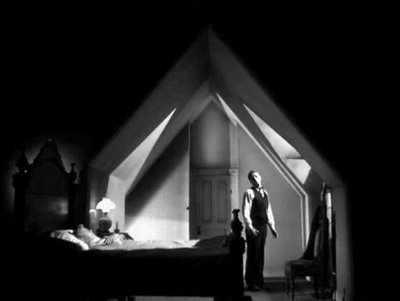I'm going to try not to give too much away, in case you want to view the movie, but I'll give you the IMDB description:
A religious fanatic marries a gullible widow whose young children are reluctant to tell him where their real daddy hid $10,000 he'd stolen in a robbery.
The director, Charles Laughton, is amazing, as are the writers, Davis Grubb and James Agee. They use so many different things to bring across the emotion of each scene, and none are expected. This is a great thing for writers/screenwriters to do. (For example, instead of having a character cry when discovering the death of a loved one, have them laugh, beg, or talk about something important to them or the deceased person.)
Most writers know an important element to conveying emotion is:
Contrast
The director's brilliant use of contrasts creates an eerie mood that every writer should appreciate. Contrasts can heighten drama. The use of light and shadow gives the movie a dreary and creepy quality. The director uses unusual angles to give the viewer a sense of things being wrong or unnatural, like the scene pictured above. He also uses the angles and the lighting behind the headboard as a twisted sort of religious imagery.
Another scene, features a cobweb in front of the boat holding the two children as they run for their lives. Which is a great example of the movie's:
Symbolism
Instead of the old stand by of a clock or calendar, these men chose a shot of a turtle to show the slow passing of time during their flight. And frightened rabits are used to suggest the children's fear. Probably my favorite symbol would be the preacher's switchblade knife, which pops out of his pocket whenever he feels unwanted desire.
The first half of the movie becomes more and more claustrophobic as use of light and shadow, as well as the size of the house, makes the children's world feel smaller and smaller. This is part of the wonderful:
Sensory detail
The story, while by no means a musical, does have a lot of music in it. The songs convey all we've talked about so far. The little girl sings a song as they run about a fly who flew away, and his wife flew away, and his two pretty children flew away. The symbolism of death and loss is written all over that song, from the words and melody to the scenery (as seen above.)
Then there's the contrast of the scene where the evil preacher sings, "Leaning, leaning," and the good lady sings along, "Lean on Jesus, lean on Jesus, " and then they go on to sing together, "safe and secure from all harm." The creators add little sensory details to capture our attention and make us feel emotions we might not normally feel. They keep us uncomfortable and unsure by their choice of music, ambient sound, interesting shapes and angles as well as suggestive scenes, like the dead woman whose hair waves in the water like the weeds (below). Long scenes pass where little action happens, yet the viewer is never bored because of the eerie details.
 From something as obvious as the flaming torches suggesting an evil
firebrand preacher, to something as small as how the son's hairstyle
denotes his feelings toward his father and the secret he must keep,
these little details make up the feeling of each scene and keep the
viewer riveted throughout.
From something as obvious as the flaming torches suggesting an evil
firebrand preacher, to something as small as how the son's hairstyle
denotes his feelings toward his father and the secret he must keep,
these little details make up the feeling of each scene and keep the
viewer riveted throughout.As writers we can all take something away from this movie. The details are everything. No matter how small a detail, it can convey meaning to the reader/viewer.
And I'll leave you with the final way this movie can help you enhance your story, with:
Clever and witty quotes
Icey Spoon: (thoughts on sex) When you've been married to a man for forty years you know all that don't amount to a hill of beans. I've been married to Walt that long and I swear in all that time I just lie there thinkin' about my canning.
Ben Harper: What religion do you profess, preacher?
Reverend Powell: The religion the Almighty and me worked out betwixt us.
Rachel Cooper: I'm a strong tree with branches for many birds. I'm good for something in this world and I know it too.
Rachel Cooper: She'll be losing her mind to a tricky mouth and a full moon, and like as not, I'll be saddled with the consequences.
Rachel Cooper: (After watching an owl carry off a rabbit) It's a hard world for the little things.
That last fabulous line is repeated (in homage, I assume) in Raising Arizona--which is a great movie to study for comedic timing.
I hope you enjoyed my study of this movie, and I'd suggest you rent it, if you haven't seen it. It's a great film.



No comments:
Post a Comment